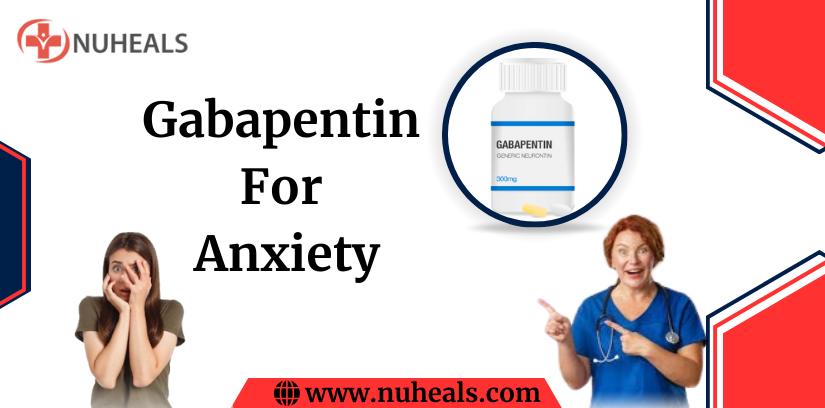Anxiety is a common mental health condition that affects millions of people worldwide. Many medications are available to treat anxiety disorders, but not all patients respond the same way. In recent years, Gabapentin, a drug originally developed to treat seizures and nerve pain, has gained attention for its off-label use to treat other conditions, including anxiety. It is effective for anxiety, but not the first choice for this use. In this article, we will discuss Gabapentin for anxiety, how it helps to treat extreme anxiety, and many other terms.
Is Gabapentin Approved for Anxiety?
Gabapentin is a trusted and proven medication that is primarily used to treat nerve pain and helps by calming overactive nerves in the body. It’s not a traditional painkiller, but highly effective for conditions caused by nerve damage or irritation.
This drug is FDA-approved to treat seizure disorders and nerve pain, but it’s also used off-label to treat many other conditions, including anxiety and nerve pain from diabetes. It may be effective for anxiety, but usually not a first-choice medication for this use. Many doctors prescribed it off-label for anxiety-related disorders, who:
- Don’t respond well to traditional anxiety medications.
- Experience anxiety related to chronic pain or substance withdrawal.
- Have co-occurring mental health and neurological issues.
How Does Gabapentin Help with Anxiety?
Gabapentin is a medicine used for nerve pain and seizures. By calming overactive nerve signals, it improves sleep, reduces discomfort, and enhances quality of life for many patients. It also helps them to feel more relaxed and sleep better. This is not officially approved for anxiety, but it may be helpful if other treatments don’t work well. Gabapentin should only be taken with a doctor’s advice for better use.
Is Gabapentin Effective for Every Kind of Anxiety?
No, Gabapentin does not work for all types of anxiety, and its effectiveness varies based on the individual and the specific anxiety disorder.
Gabapentin is most commonly prescribed for:
- Generalized Anxiety Disorder (GAD): This medicine provides some benefit in reducing chronic worry, restlessness, and tension in people with GAD.
- Social Anxiety Disorder (SAD): Gabapentin can reduce symptoms of social anxiety, particularly before social events or performance situations.
- Panic Disorder: Gabapentin is less commonly used for panic disorder. But it is not widely supported by research or standard clinical practice for this condition.
Typical Gabapentin Dosage for Anxiety
Gabapentin is often prescribed off-label for anxiety, and the dosage may vary based on the person’s response and tolerance. Dosage varies depending on individual needs, but common guidelines include:
- Starting dose: Around Gabapentin 100 mg to Gabapentin 300 mg once or twice daily.
- Common effective dose: Gabapentin 900 mg to Gabapentin 1800 mg per day, divided into 2–3 doses.
- Maximum dose (in most anxiety cases): Up to Gabapentin 2400 mg per day.
Benefits of Gabapentin for Anxiety
- Reduces Physical Symptoms – Gabapentin may help with anxiety-related physical symptoms like muscle tension, restlessness, and insomnia.
- Non-Addictive – Gabapentin has a lower potential for dependence than benzos.
- Helps with Comorbid Conditions – People with both anxiety and nerve pain or seizures may benefit from Gabapentin’s dual effects.
- Useful for Treatment-Resistant Anxiety – For those who don’t respond well to SSRIs or SNRIs, Gabapentin may offer relief.
Side Effects of Gabapentin
Gabapentin is primarily used for pain relief. Like other medications, it has some benefits, but if it is used in an overdose or missed dose, it will show side effects. Some common side effects are:
- Drowsiness or dizziness
- Fatigue
- Nausea or upset stomach
- Weight gain
- Swelling in the extremities
- Mood changes
Who Should Avoid Gabapentin?
Though Gabapentin is an effective treatment for nerve pain and seizures, it is sometimes not suitable for people with kidney disease, those with a history of substance abuse, pregnant or breastfeeding women, and individuals allergic to the Gabapentin pill. So, it is advised that when you use Gabapentin, first consult a healthcare provider, then use it under their close supervision.
Is Gabapentin Addictive?
Gabapentin is not classified as a controlled substance in most areas, but some people misuse it, especially at high doses. While it has a low addiction risk, it’s still important to use it exactly as it is prescribed. Some U.S. states have begun monitoring Gabapentin more closely due to reports of misuse, especially in combination with opioids.
Conclusion:
Gabapentin may be an effective treatment for managing anxiety when traditional treatments aren’t effective. Thus, it’s not a first-line option, many patients have reported relief from anxiety symptoms with proper medical guidance. Gabapentin can help reduce anxiety-related symptoms like restlessness, tension, and sleep issues. It should always be used under medical supervision, as it can have side effects. If you’re considering Gabapentin for anxiety, speak with your doctor to determine. Is it the right option for you, because Gabapentin may help with anxiety in some people, but it’s not for everyone.





